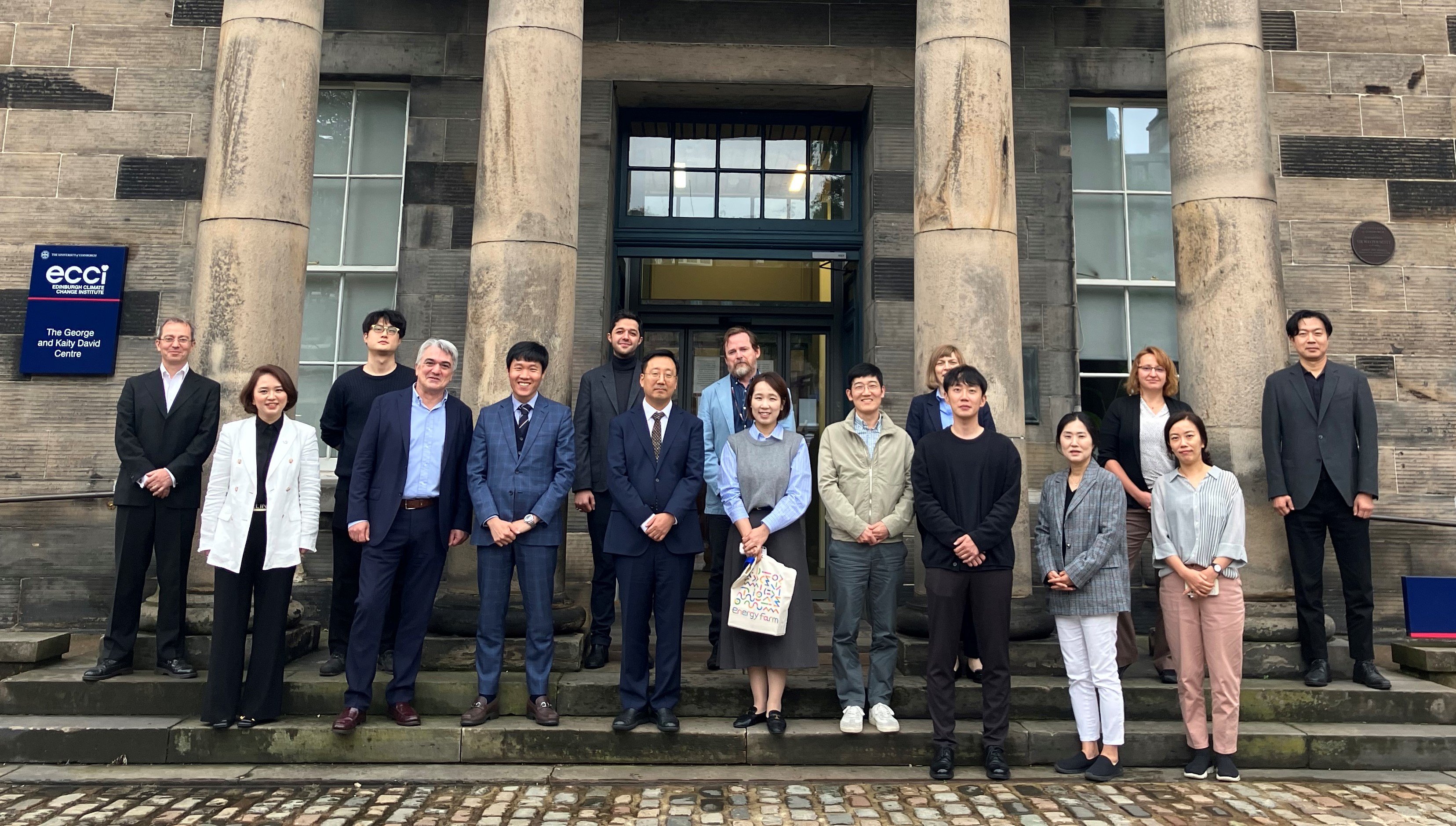On the 19th of September, SCCS welcomed senior staff from the British Embassy in Seoul, delegates from Korea Hydro & Nuclear Power (KHNP) and Doosan Mobility Innovation Inc., and representatives from the Korean media to the Edinburgh Climate Change Institute (ECCI). During the half-day visit, they shared knowledge and explored opportunities to collaborate on research projects related to hydrogen storage and distribution.
Yun-Sang Lee, Vice President of KHNP Hydrogen Business Office, and Romain Viguier, Business Development & Project Manager at SCCS, opened the meeting highlighting the UK and Korea’s common goal to achieve Net Zero by 2050 and interest in strengthening links to develop the necessary technologies to do so.
The visit follows the signing of collaborative agreements earlier this year between KHNP and the British Embassy Seoul for a ‘Net Zero Partnership’ aimed at establishing a clean hydrogen ecosystem and promoting carbon neutrality, and between SCCS and the Korea CCUS Association to develop and promote Carbon Capture Utilisation and Storage (CCUS) technologies.
After a brief overview of the SCCS partnership and capabilities by Viguier, Katriona Edlmann Chancellor's Fellow in Energy at the School of Geosciences, The University of Edinburgh, presented the results of the HyStorPor project, which has been investigating the feasibility of subsurface geological storage of hydrogen in porous rock. Storing large amounts of energy as hydrogen will be critical to balance supply and demand as we transition to use more renewable, but intermittent, energy sources such as solar and wind. Edlmann and colleagues have shown that geological storage of hydrogen is commercially and technically feasible.
Her presentation was followed by a short talk by Andrew Cavanagh, Net Zero & Storage Expert at SCCS, who has been examining the location, capacity, and characteristics of hydrogen storage sites in the UK and Europe as part of the HyUSPRe project. The main geological storage sites for hydrogen are likely to be depleted gas fields, and to a much lesser degree, aquifers and salt caverns, based on the historic development of natural gas storage across the region. Research to date suggests that Europe’s hydrogen storage requirement totals approximately 1,000 terawatt-hours, which would provide around 30 % storage for the forecast annual demand by 2050. Given the geographically limited availability of thick salt, and successful industry experience of gas storage in depleted gas fields, the expectation is for around 80% of hydrogen storage to be distributed in small, repurposed gas fields onshore, close to existing clusters of natural gas storage sites. This leaves the large, depleted gas fields and saline aquifers of the North Sea free for CO2 storage.
Next, delegates heard from Su-Jy Lee, Senior Manager KHNP Hydrogen Business Office, about the company’s hydrogen production projects and R&D centre completed in 2022, and from Yongsu Kang, Senior Business Development Manager at Doosan Mobility Innovation, about the latest applications for hydrogen fuel cells, including drones, robots and vehicles.
The presentations came to a close with a talk by Stefano Brandani, Professor of Chemical Engineering, and Hyungwoong Ahn, Senior Lecturer, that outlined the expertise of The Carbon Capture group at The University of Edinburgh's School of Engineering in analysing, comparing and optimising carbon capture technologies. Ahn, inventor of an advanced adsorption process that enables high-purity carbon dioxide capture without requiring unrealistically low pressures for desorption, is testing the technology with HD KSOE (HD Korea Shipbuilding and Offshore Engineering Co.) to capture carbon dioxide from ships.
After exchanging gifts, attendees enjoyed a networking lunch in which they were able to further discuss advances in the development of hydrogen production technologies in the UK and South Korea.
“It was a pleasure to welcome the delegation led by Mr Lee Yun-Sang, Vice President of the Hydrogen Business Office at KHNP, to visit SCCS the Edinburgh Climate Change Institute. Our CCS expertise on gas separation technologies, gas storage and monitoring, for example, are now essential for the development of the hydrogen sector. SCCS has developed a long-lasting working relationship with Korean partners on various CCS projects, and we are looking forward to expanding our cooperation on hydrogen,” said Dr Romain Viguier, Business Development and Project Manager at SCCS.


